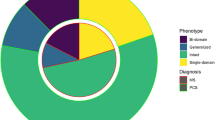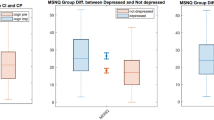Abstract
The disability, cognitive impairment, fatigue and depression are interacting features in multiple sclerosis (MS), whose relation is still unclear. The objective of this study was to evaluate in a sample of MS patients, the frequency of depressive symptoms, its predicting factors and relation with cognitive impairment, fatigue and disability. 255 consecutive MS patients and 166 healthy subjects were assessed for the presence of depressive symptoms with the Beck Depression Inventory-Fast Screen (BDI-FS). Patients with BDI-FS ≥4 were further investigated for the presence of neuropsychological impairment. Depressive symptoms were significantly more frequent and severe in patients than in controls. EDSS score was the only predicting factor of depression (3.5 = threshold EDSS score for depressive symptoms) in patients, whereas neuropsychological impairment was not correlated with BDI-FS and fatigue was found to be significantly correlated with attention, executive function and memory test scores, as well as with BDI-FS score in patients.
Similar content being viewed by others
References
Tsivgoulis G, Triantafyllou N, Papageorgiou C, Evangelopoulos ME, Kararizou E, Sfagos C et al (2007) Associations of the Expanded Disability Status Scale with anxiety and depression in multiple sclerosis outpatients. Acta Neurol Scand 115:67–72
Joffe RT, Lippert GP, Gray TA, Sawa G, Horvath Z (1987) Mood disorder and multiple sclerosis. Arch Neurol 44:376–378
Minden SL, Orav J, Reich P (1987) Depression in multiple sclerosis. Gen Hosp Psychiatry 9:426–434
Patten SB, Metz LM, Reimer MA (2000) Biopsychosocial correlates of lifetime major depression in a multiple sclerosis population. Mult Scler 6:115–120
Chiaravalloti ND, DeLuca J (2008) Cognitive impairment in multiple sclerosis. Review. Lancet Neurol 7:1139–1151
Patten SB, Beck CA, Williams JVA, Barbui C, Metz L (2003) Major depression in multiple sclerosis: a population-based perspective. Neurology 61:1524–1527
Stenager EN, Stenager E, Koch-Henriksen N, Brønnum-Hansen H, Hyllested K, Jensen K et al (1992) Suicide and multiple sclerosis: an epidemiological investigation. J Neurol Neurosurg Psychiatry 55:542–545
Peyser JM, Rao SM, LaRocca NG, Kaplan E (1990) Guidelines for neuropsychological research in multiple sclerosis. Arch Neurol 47:94–97
Benedict RH, Cookfair D, Gavett R, Gunther M, Munschauer F, Garg N et al (2006) Validity of the minimal assessment of cognitive function in multiple sclerosis (MACFIMS). J Int Neuropsychol Soc 12:549–558
Rao SM (1986) Neuropsychology of multiple sclerosis: a critical review. J Clin Exp Neuropsychol 8:503–542
Rao SM, Leo GJ, Bernardin L, Unverzagt F (1991) Cognitive dysfunction in multiple sclerosis. I. Frequency, patterns, and prediction. Neurology 41:685–691
DeSousa EA, Albert RH, Kalman B (2002) Cognitive impairments in multiple sclerosis: a review. Am J Alzheimers Dis Other Demen 17:23–29
Bobholz JA, Rao SM (2003) Cognitive dysfunction in multiple sclerosis: a review of recent developments. Curr Opin Neurol 16:283–288
Shevil E, Finlayson M (2006) Perceptions of persons with multiple sclerosis on cognitive changes and their impact on daily life. Disabil Rehabil 28:779–788
Arnett PA, Barwick FH, Beeney JE (2008) Depression in multiple sclerosis: review and theoretical proposal. J Int Neuropsychol Soc 14:691–724
Landrø NI, Celius EG, Sletvold H (2004) Depressive symptoms account for deficient information processing speed but not for impaired working memory in early phase multiple sclerosis (MS). J Neurol Sci 217:211–216
Lynch SG, Parmenter BA, Denney DR (2005) The association between cognitive impairment and physical disability in multiple sclerosis. Mult Scler 11:469–476
Schapiro R. (2002) The pathophysiology of MS-related fatigue: what is the role of wake promotion? Int J MS Care 6–8
Patten SB (2005) Treatment of neuropsychiatric syndromes in multiple sclerosis. Expert Rev Neurother 5:413–420
DeLuca J (2005) Fatigue, cognition, and mental effort. In DeLuca J ed. Fatigue as a window to the brain, MIT Press. Cambridge 37–57
Krupp LB, Elkins LE (2000) Fatigue and declines in cognitive functioning in multiple sclerosis. Neurology 55:934–939
Polman CH, Reingold SC, Edan G, Filippi M, Hartung HP, Kappos L et al (2005) Diagnostic criteria for multiple sclerosis: 2005 revisions to the “McDonald Criteria”. Ann Neurol 58:840–846
Beck AT, Steer RA, Brown GK (2000) BDI-Fast Screen for medical patients: manual. Psychol Corp, San Antonio
Benedict RHB, Fishman I, McClellan MM, Bakshi R, Weinstock-Guttman B (2003) Validity of the Beck Depression Inventory-Fast Screen in multiple sclerosis. Mult Scler 9:393–396
Kurtzke JF (1983) Rating neurologic impairment in multiple sclerosis: an expanded disability status scale (EDSS). Neurology 33:1444–1452
Fisk JD, Ritvo PG, Ross L, Haase DA, Marrie TJ, Schlech WF (1994) Measuring the functional impact of fatigue: initial validation of the fatigue impact scale. Clin Infect Dis 18(Suppl 1):S79–S83
Rao SM and the Cognitive Function Study Group of the National Multiple Sclerosis Society (1990) A manual for the brief repeatable battery of neuropsychological test in multiple sclerosis. medical college of wisconsin
Novelli G, Papagno C, Capitani E, Laiacona M, Vallar G, Cappa SF (1986) Tre test clinici di ricerca e produzione lessicale, taratura su soggetti normali. Archivio di Psicologia, Neurologia e Psichiatria 47:477–506
Foundation for Statistical Computing (2009), Vienna, Austria. ISBN 3-900051-07-0, http://www.R-project.org (R Development Core Team )
Amato MP, Ponziani G, Rossi F, Liedl CL, Stefanile C, Rossi L (2001) Quality of life in multiple sclerosis: the impact of depression, fatigue and disability. Mult Scler 7:340–344
Lynch SG, Kroencke DC, Denney DR (2001) The relationship between disability and depression in multiple sclerosis: the role of uncertainty, coping, and hope. Mult Scler 7:411–416
Zorzon M, de Masi R, Nasuelli D, Ukmar M, Mucelli RP, Cazzato G et al (2001) Depression and anxiety in multiple sclerosis. A clinical and MRI study in 95 subjects. J Neurol 248:416–421
Zephir H, De Seze J, Stojkovic T, Delisse B, Ferriby D, Cabaret M et al (2003) Multiple sclerosis and depression: influence of interferon beta therapy. Mult Scler 9:284–288
Möller A, Wiedemann G, Rohde U, Backmund H, Sonntag A (1994) Correlates of cognitive impairment and depressive mood disorder in multiple sclerosis. Acta Psychiatr Scand 89:117–121
Siepman TAM, Janssens ACJW, de Koning I, Polman CH, Boringa JB, Hintzen RQ (2008) The role of disability and depression in cognitive functioning within 2 years after multiple sclerosis diagnosis. J Neurol 255:910–916
Minden SL, Schiffer RB (1991) Depression and mood disorders in multiple sclerosis. Neuropsychiatry Neuropsychol Behav Neurol 4:62–77
Demaree HA, Gaudino E, DeLuca J (2003) The relationship between depressive symptoms and cognitive dysfunction in multiple sclerosis. Cogn Neuropsychiatry 8:161–171
Good K, Clark CM, Oger J, Paty D, Klonoff H (1992) Cognitive impairment and depression in mild multiple sclerosis. J Nerv Ment Dis 180:730–732
DeLuca J, Barbieri-Berger S, Johnson SK (1994) The nature of memory impairments in multiple sclerosis: acquisition versus retrieval. J Clin Exp Neuropsychol 16:183–189
Wishart H, Sharpe D (1997) Neuropsychological aspects of multiple sclerosis: a quantitative review. J Clin Exp Neuropsychol 19:810–824
Diagnostic and statistical manual of mental disorders (2000) (4th edn., text rev.). American Psychiatric Association, Washington
Author information
Authors and Affiliations
Corresponding author
Rights and permissions
About this article
Cite this article
Mattioli, F., Bellomi, F., Stampatori, C. et al. Depression, disability and cognitive impairment in multiple sclerosis: a cross sectional Italian study. Neurol Sci 32, 825–832 (2011). https://doi.org/10.1007/s10072-011-0624-2
Received:
Accepted:
Published:
Issue Date:
DOI: https://doi.org/10.1007/s10072-011-0624-2




